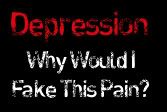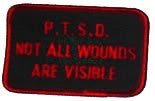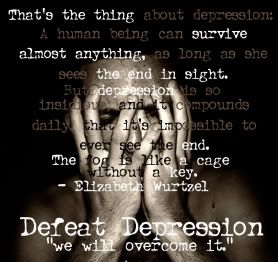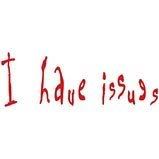Although I desperately want you to understand, I know most people, even mental health professionals, cannot. I can't just snap out of it no more than someone can snap out of heart disease. Thinking positively will not do it either. Do you not get that I am in serious pain everyday all the time. "No, I can't just get better." "Yes, it is that bad and no, I am not feeling sorry for myself." "No, I am not trying to escape my responsibilities. I want to work and take care of household and personal tasks." "I am not doing this to be treated special and no, I'm not over it yet!" I've heard those comments and thought about them and tried some and failed. I feel like I am a failure. I know that you meant well, but you were not helpful. I just feel like retreating more. My feelings were hurt. Please read the following and maybe you will understand me more.

I was in psychotherapy for 12 years and then things were pretty good until about 4 1/2 (November 2003) years ago when I figured out I was depressed. Well, I know the symptoms, but I did not pick them up. I returned to therapy and to taking medications which I had done previously for about 7 years. Even so, my sleep is all disturbed. I wake up about 1 to 3 am almost every morning and go back to sleep about 6 am and sleep during the day.
I actually cannot remember not having disruptive sleep ever except for maybe a one year period after I was married. Dr. Doobe indicated that it is common for a person under my circumstances to have difficulties with sleep disturbances. At least, since I am not working it helps because I can sleep whenever I am tired then it is usually a 2-3 hour nap and sometimes two during the day.
During this second time in therapy with Geoffrey, I began to have flashbacks and memories of neglect, physical, emotional and sadistic sexual abuse. I became incapacitated at home and would not leave the house except for work. Everything became overwhelming I couldn't shop (me not shop...you know it is serious), clean the house, cook, bake, etc. All I could manage to do was to work, which I kept up to date, and at the beginning no one noticed and went to therapy 5 times per week. Yes, I had long days. Work was my way of trying to prove that I was "okay," when I was anything but okay.
Maybe, it was my way of getting out of the housework because my dear, dear, sweet husband began to take over the household duties. This included paying the bills. I had never before had missed payments, not kept the ledger up to date and would balance to the penny. Well, let us say that he had to start from scratch. And, I was one to balance the checkbook to the penny. Oh, the answer is "no," I was not trying to get out of anything. I just want to feel normal again, but I'm not sure what that is...it seems like it has been so long.
All at the same time, he began sleeping in the extra bedroom to make me feel safer. He volunteered...imagine a man doing that. You know that God was at work here because nothing was wrong with him. Our church began to provide meals. It felt like I was living a double life...a part had it all together and the other was falling apart and a mess. I went to work everyday feeling overwhelmed and panicked. Medications helped some, but not enough.

About 1 1/2 years ago, working and going to therapy caught up with me and I was no longer able to work. It was continue to work and be hospitalized or stop working and hopefully I won't need hospitalization. The situation at work had changed, I was having more difficulties concentrating and with fragmenting and a new supervisor "re-traumatized" me due to her supervisory skills. Most of those under her left for other jobs. The unfortunate thing is that I loved my job and envisioned being there a long time. But, I figure that God knows what He is doing. Also, I would not have been able to do the tougher emotional work while being employed. This has been a good thing.
Now, I am a little better. But, I still have to gage if I can tolerate going out and handling the crowd without going away or becoming overwhelmed. Then, afterward and the next day I sleep and sleep and sleep. Also, there are days when I just don't want to get out of bed and if I do and don't have to go anywhere I don't brush my teeth, shower or get out of my pajamas. These are some specific examples of major depression versus dysthymia which is painful as well. Geoffrey and I figure that I've been depressed my whole life with periods of major depressive episodes.
Depressive disorders are mental illness that are treatable and manageable, but need to be taken care of just as someone with heart disease would. No one would dare say or think any of the above about someone who has had a heart attack. But, somehow, everyone treats mental illness differently. Sometimes, it feels like some people are afraid they are going to catch it.
Major Depression is a serious medical illness affecting 18 million American adults, men and women of all ages, races and economic levels. Unlike normal emotional experiences of sadness, loss, or passing mood states, major depression is persistent and can significantly interfere with an person's thoughts, behavior, mood, activity and physical health. It is the leading cause of disability in the United States and usually strikes people between the ages of 25 and 44.
Twice as many women as men are diagnosed with Major Depression. It is not fully understood why. After a single episode, a person is more likely to have another one and after the second the percentage exponentially increases with each episode. There is evidence that the brain may make permanent changes making someone more susceptible to another episode. I've had a least five, but only two were diagnosed and treated. The others were before age 21. Without treatment, the frequency as well as the severity increases over time and can lead to suicide. However, with proper treatment a person can recover as long as they don't give up on the treatment.
Symptoms:
- persistently sad, anxious or irritable mood
- pronounced changes in sleep, appetite, and energy
- difficulty thinking, concentrating and remembering
- physical slowing or agitation
- lack of interest in or please from activities that were once enjoyed
- sleeping too much or can't sleep
- feelings of guilt, worthlessness, hopelessness and emptiness
- recurrent thoughts of death or suicide
- persistent physical symptoms that do not respond to treatment, such as headaches, digestive disorders and chronic pain.
Psychological, biological, and environmental factors may all contribute to the development of a depressive episode. Whatever the specific cause of depression, scientific research has firmly established that it is a biological, medical illness. Neurotransmitters are thought to be involved which is what medications address. There is also some evidence that there is a genetic predisposition. Also, discuss with your doctor your medical history as some illness may influence depression especially hypothyroidism.
Reportedly, between 80-90% of those treated for Major Depression return to their usual daily activities and feelings. I did so successfully for about five years, but this episode is much worse and I don't feel as hopeful. But, all indications are that I will recover to some degree although it is taking much longer than I want it to partly because it is complicated by post-traumatic stress disorder (another post).
Possible complications of depression include suicide (15% of people with major depressive disorder die by suicide), increased risk of alcohol and drug related problems, increased risk of tobacco dependence and increased risk of problems with physical health and premature death due to medical illness.
Call 911, a suicide hotline or get safely to an emergency room if you have thoughts of suicide, a suicidal plan or thoughts of harming yourself or others. If a loved one expresses such thoughts, it is okay to let them talk about it. By not talking about it, it becomes a "taboo" subject, so they may not go to you if they are at risk. If they talk about it, you can be sure that they have been thinking about it.
Your doctor needs to be called right away if you hear voices, see things, smell things, feel things that are not there (psychosis which can accompany MDD; have frequent crying spells, if your work, school or family life is disrupted for two or more weeks; and if you or someone else thinks that you should cut back or stop drugs or alcohol. Side effects of some medication includes depression, but DO NOT stop taking it without talking to your doctor.
Depression effects men and women in different ways which is a fairly new area of study. They process medications differently. Neurochemicals such serotonin (used by the brain to stabilize mood) is processed differently between men and women. Suicide attempts are more common in women, but men are more likely to be successful. Men are more likely to be diagnosed with alcohol problems, but women are at higher risk following an episode of depression.
Women's changing hormones provide additional challenges. Under age 13, approximately equal numbers of girls and boys experience depression. Once they reach age 13 girls are more likely to become depressed. I know that right before and during my menstrual cycle that my symptoms are more difficult. While women may cry, become withdrawn, and gain or lose weight, men may abuse alcohol or drugs, or eat excessively, and/or become violent to themselves or others. Men keep things hidden while women are more open about their feelings. Additionally, older adults, children and adolescents will experience and express depression in atypical ways.
Preventative measures include, stress management; avoiding drugs, alcohol and caffeine; exercise regularly; and maintaining good sleeping habits. If you are socially isolated try volunteering or get involved in some social group. Medications and psychiatric treatment my prevent recurrences; however, some are not preventable.
Some helpful tips if you have a depressive disorder. You are not a failure if you cannot do these. Participate in mild activity or exercise. At the beginning, I was able to exercise, but now I do not have the energy or motivation. Participate in things that you once enjoyed. I have continued to go to music concerts, at least, one time per year. I am also beginning to read my cookbooks again and look on the Internet.
Set realistic goals for yourself. Break a large task into smaller tasks, so you don't feel so overwhelmed. Try to spend time with a friend or relative and confide in them. Try not to isolate yourself and let others help you. This is difficult for me, but I have let my therapist, a couple of friend and my husband in more and more. The biggest step was starting this blog. Postpone making major life decisions.
Remember, it is normal for appetite and sleep to be disrupted. Be gentle with yourself. Don't expect to snap out of it or for you to feel better "sooner." I get into trouble with this all the time because I always want to be further than I am instead of accepting the progress that I have made.
If you know of someone who has a major depressive disorder. The most important thing you can do is to take care of yourself first before attending to the person who is depressed. Remember what they say on an airplane, put your breathing mask on first, then help others. After that the best thing you can do is to encourage them to seek a diagnosis and treatment. It is okay to shop around for a therapist and psychiatrist. It is important to have a good match because they need to be able to tell them the truth about how they feel which means they need to be as comfortable as possible.
Please, know that sharing of this sort will cause an increase of some symptoms and that you will never be completely comfortable with a health care professional. This is normal.
Never ignore comments about suicide, and report them to your friend's or relative's therapist or doctor. They maybe angry for awhile, but it is necessary. You don't want to end up at their funeral with regrets. Invite them out even if they decline, but don't push too soon or it will feel demanding or overwhelming and increase feelings of worthlessness and failure. Remind yourself and them that with time and treatment, that the depression will get better.
I have a name, remember me and not my illness. My name is not, "depression." Please don't whisper anymore when you think I'm not listening or spread gossip behind my back or back away from me and pretend you don't see me. Please try to understand and help me. If you don't want to help, at least, don't make it worse by making me feel "different," unseen, worthless or like I'm a failure. Remember, there are at least 18 million of us. One of them might be you.
(Disclaimer: Although I have worked with mentally ill persons for twenty years, I do not have a Master's Degree or a license. This is not meant to be a substitute for mental health care or treatment. Please obtain professional assistance from the above resources, if needed. And call 911 if you or someone is in immediate danger.)







































4 comments:
Great post! The brain images are fascinating (and scary).
Pink Floyd,
Thank you. I really like using brain images because it helps to validate and show people that it isn't all in our heads...I mean it is, but you know what I mean. The real question is which comes first the brain changes or the depression. Chicken or the egg thing. Thanks for visiting.
Take care,
CC
This is a great post! Thank you for sharing that with us.
The paintings are wonderful!
Faith
Faith,
Thank you! I appreciate the visit and the compliments.
Post a Comment